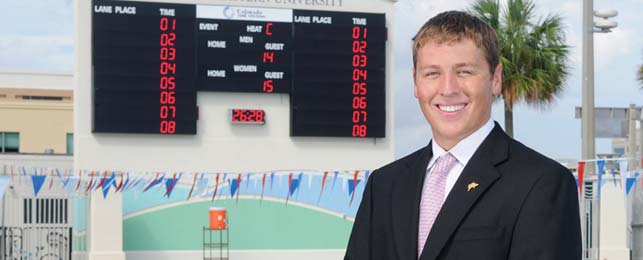
Jonathan Key
Swimming: a Lifesaver for Student-Athlete
By Walter Villa
In a way, swimming kept Jonathan (J) Key from drowning in a sea of despair.
Key, a senior at Nova Southeastern University, was eight years old when a coach in his hometown of Waynesville, North Carolina, discovered his talent in the water. By the time he was 12, Key was beating much older children regularly.
“I joined my high school varsity team as a seventh grader,” Key said. “I found that I could beat these high school guys— seniors who were two feet taller than me and twice my size. I could crush them in the pool, and it was at that point that I decided: ‘This is what I need to do.’ ”
But Key had a bigger obstacle to overcome—his severe dyslexia. (He was diagnosed at age seven.) Key’s parents, Barbara and Jonathan, noticed their son’s issues with reading and writing in the first grade, but it was a year before he was tested and diagnosed. When his parents enrolled him in a private school where there was one teacher for every three students, Key flourished and studying became fun. “We knew,” said his father, “that given the proper instruction, J was just as smart as anybody else.”
Key went on to Carolina Day High School and excelled, both in the classroom and in the pool, where he set 11 school records, 4 conference marks, and 1 state standard. His swimming earned him a scholarship to NSU, but as a freshman, he fared poorly in the classroom.
“When I continued to have problems, I knew I had to do something,” Key said. Meetings with C. A. Tolchinsky, Ed.D., manager of NSU’s Student-Athlete Academic Services, changed Key’s academic direction.
“By entering the Academic Success program, we got a handle on what his struggles were academically,” Tolchinsky said. “Key is a role model for any student needing help.”
Key explained that his coach and some professors knew about his dyslexia, but he hadn’t utilized NSU’s full resources until he met with Tolchinsky. “I kind of wanted to prove I could do it on my own,” he said. The campus resources used to help Key also included the Office of Disability Services, the Office of Career Development, the Office of Academic Services, and the Office of Undergraduate Student Success.
Once he got help, Key’s academics and his swimming advanced. As a junior, he finished in the top 10 in two Sunshine State Conference Championship events—seventh in the 200- yard breaststroke and ninth in the 400-yard individual medley.
“He’s more confident now,” said Hollie Bonewit-Cron, NSU swim coach. “He walks around with a little more swagger, and it’s nice to see.” Academically, Key’s grade point average went from a low of 1.15 to a high of 3.4.
He also was the recipient of a 2013 Wilma Rudolph Award, given by the National Association of Academic Advisors for Athletics. The award honors student-athletes who overcome adversity en route to achieving academic success.
Key, a criminal justice major, is on track to graduate in spring 2014. He recently completed an internship with the Coconut Creek Police Department and is interested in working on a tactical squad such as a SWAT team. Obviously, Key is not letting dyslexia hold him back.
This story was originally published in the Spring 2014 issue of Horizons Magazine.